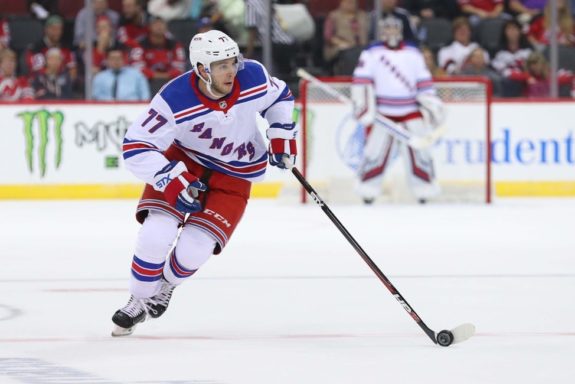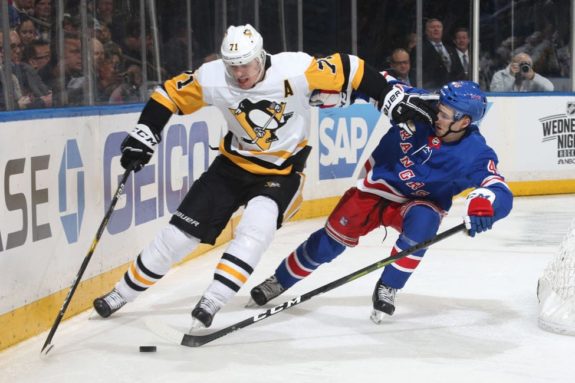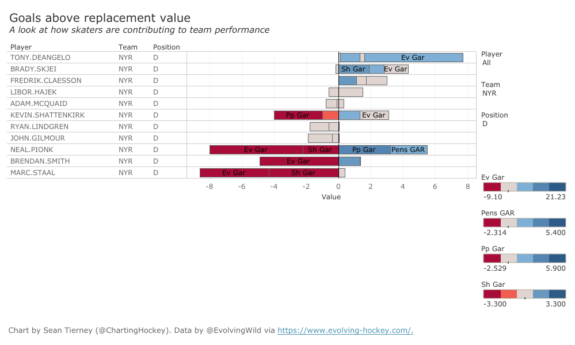
Small sample sizes make for a dubious environment for contract speculations. On one hand, small sample sizes can also lead to regrettable long-term contracts. However, the lesser size can often make for a budgeted contract that will be become a bargain in the future. There’s little to believe that Anthony DeAngelo can’t become the latter of those two scenarios.
DeAngelo has played in just 132 games in his career, with 93 of those as a New York Ranger. That number would’ve been higher if head coach David Quinn hadn’t designated DeAngelo as a healthy scratch for multiple contests in the first half of the 2018-19 season.

The 23-year-old defenseman began to find his game towards the end of the season as he began logging more time-on-ice and finally contributing offensively. His 2018-19 season is a massive step forward in his development, but it raises a tough question of contract length for the Rangers management as he reaches restricted free agent status. Fortunately, his numbers and the play from fellow Rangers defensemen make for an easy case to retain DeAngelo’s talents for the better part of the rebuild.
Neal Pionk’s Expendability
General manager Jeff Gorton has done an exceptional job building a fare share of top-end defensive prospects thus far in the rebuild. Names such as K’Andre Miller, Yegor Rykov, Ryan Lindgren, Adam Fox, Nils Lundkvist and Libor Hajek all appear to be future staples for the Rangers’ blue line, however, many of those listed play on the left side.
As it stands, the Rangers will have DeAngelo, Kevin Shattenkirk, Fox, and Neal Pionk to man the right side of their projected 2019-20 opening roster. Unless the Rangers vote to keep Fox in the minors for the beginning of the season, that’s a bit of a logjam of mediocrity on the right side.

When Pionk wasn’t consistently scoring, it became evident that he had little impact on the overall shot share at even strength, whereas DeAngelo often excelled in that category. Pionk’s minus-3.06 relative Corsi for percentage (relCF%) at 5v5 was second-worst among Rangers defensemen while DeAngelo boasted a 0.71 relCF%.
The two right-handed shots were often competing for playing time between one another. Pionk would eventually log 1163:21 minutes at 5v5 in 73 games, whereas DeAngelo logged 988:15 in 61 games. Pionk averaged nearly two minutes more the DeAngelo in average TOI-per-game.
Barring a trade for Jacob Trouba or the acquisition of a free agent defenseman, Pionk is slated to be the odd man out in the depth charts. Pionk’s 2018-19 season was full of defensive lapses and a lack of reliability as he emerged as the least effective blueliner on the Rangers’ roster.
Pionk posted a team-worst even strength goals-above-replacement of minus-5.8 through the 2018-19 season. He progressively became one of the least reliable defensemen despite playing in the third most games on the Rangers’ blue line.
Numbers Back Up the Term
In comparison, DeAngelo posted a team-best 6.1 even strength goals-above-replacement in his 61 games played this past season. Despite the small sample size and limited role, DeAngelo quickly emerged into the Rangers’ most effective offensive d-man.
When Shattenkirk was out with his knee injury, DeAngelo excelled as a power-play specialist. He logged a GAR of 1.2 on the man advantage, second only to Pionk with his GAR of 3.2 on the power play. DeAngelo was the only Rangers defenseman to have a positive GAR at even strength, power play, and shorthanded. He led the blue line in both overall GAR with 7.7 and a wins above replacement of 1.4.
DeAngelo also led the Rangers’ blue line in total points, offensive point shares, and overall point shares this past season. He logged 21 of his 30 points in the final 35 games of the season after an extended trip to the Quinn bin as a healthy scratch. His 16 assists at even strength were tied with Brady Skjei for the team lead among defenseman.

DeAngelo’s attitude problems come into play when considering keeping him a Ranger for the next four-plus years. The question of whether his toxicity in the locker room remains a trying issue as the Rangers build a new culture. The underlying numbers and his sky high ceiling outweigh the negatives of his potential toxicity. He has all but earned himself a contract that extends for four or five years.